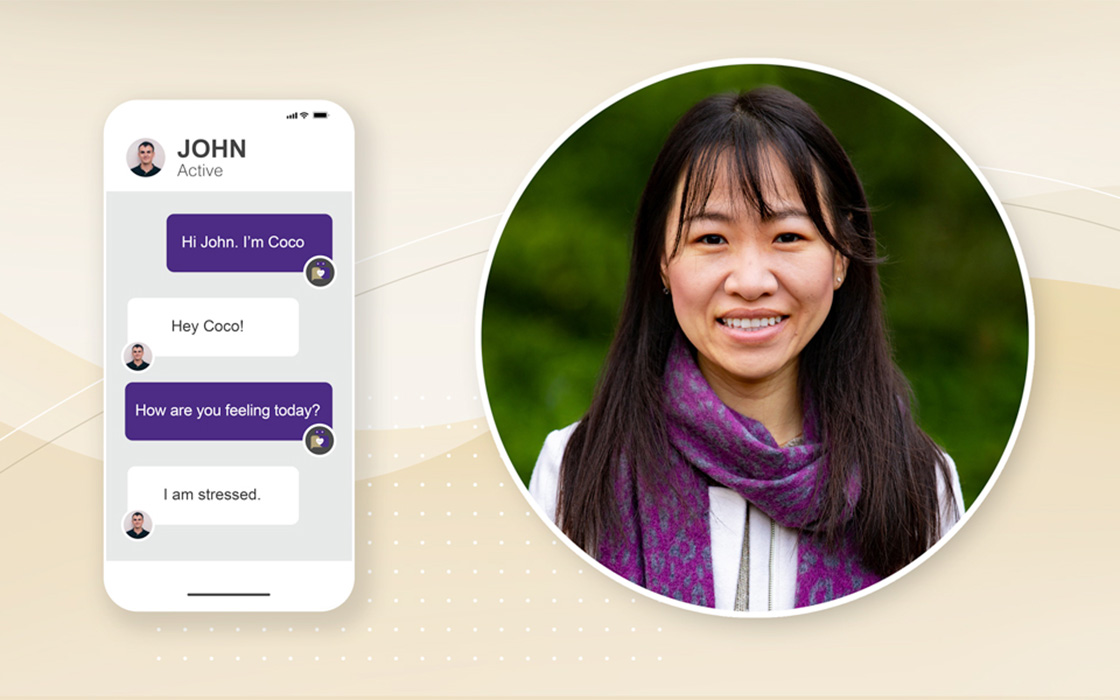
Taking Care of Caregivers
A tri-campus team is developing a chatbot to support caregivers of children with chronic conditions.
Children are wonderful but raising them is a lot of work. This is an obvious statement but consider what that looks like. Diapers, late night feedings, stuffy noses, vomit, doctor’s appointments, clothes shopping, trying to explain why something is right and something else isn’t, school, homework, extra-curricular activities, money — so much money. Hormones, fights with a sibling or someone else, dating, late nights waiting for a son or daughter to come home from an evening out, driving. That ambiguous and potentially unkind thing that is seemingly always on its way — i.e. the future.
Being a parent or caregiver to a child is a job with no time clock. You’re always on, always trying to give a child what they need while trying not to forget yourself whether that’s your career goals, hobbies, friendships or other. Now, add in chronic illness, say a child with asthma, and the seemingly impossible happens, mainly that joyous and also challenging responsibility just got a little more difficult.

Stress seems inevitable in the above scenario. Enter a tri-campus team of UW researchers, including Assistant Professors Weichao Yuwen and Sunny Cheng from UW Tacoma and colleagues from UW Bothell and UW in Seattle. “We are developing an intervention for caregivers of children with chronic conditions,” said Yuwen.
In March of 2019, the University of Washington Population Health Initiative awarded a pilot research grant to the team for their project called “Tailored Self-Management Program for Caregivers of Children with Chronic Conditions (CocoBot).” “These caregivers are stressed out, fatigued and suffer from sleep problems,” said Yuwen. “We wanted to see what we could do to support them.”
Yuwen and the rest of the researchers are currently working on a CocoBot prototype. The eventual goal is to build a chat bot that a person could access on a smart phone or other device. Yuwen outlines one way the program would work. “Say you’re the parent of a four year-old who suffers from asthma and had an attack at school,” she said. “The attack has passed and everything is okay but you’re worrying late into the night.” A person could open CocoBot and get support. “We imagine using an established behavioral intervention to help people, to give them tools to problem-solve challenges they encounter as caregivers.”
Ideally, “Coco” and the user would have built a relationship over a period of time. This would allow the program to tailor its advice to the individual. “Maybe you like to take warm baths to help you calm down,” said Yuwen. “Well, CocoBot could send a text with a reminder like ‘Hi Weichao, remember we talked about those different practices you can do to help you calm down before bedtime.’”
Privacy is a concern for the CocoBot team. “We’re building on a platform that is HIPAA compliant,” said Yuwen. HIPAA is the Health Insurance Portability & Accountability Act of 1996. It establishes regulations and security standards protecting the privacy of health information.
Developing a chat bot that can connect with a person requires a fair amount of testing. The first step in this process is the “Wizard of Oz” test. Essentially, a group of actors will be tasked with using CocoBot. “We’ll have a ‘wizard’ in the back that can help Coco write up responses when she gets stuck,” said Yuwen. “The information gathered during this phase will help us refine the algorithms.”
Actual caregivers will be brought in later in the process. “We’re working with different community partners like the Puget Sound Asthma Coalition and Seattle Children’s Hospital to help us find participants,” said Yuwen.
Big plans are in the works for CocoBot. The researchers are looking to sponsor student projects to help integrate different interventions. “The Amazon Echo, for instance, can be used to provide white noise for someone who is having trouble sleeping,” said Yuwen. The team also hopes to utilize digital biomarkers from devices like the Fitbit or Apple Watch. Plans are already underway for a version of CocoBot that can communicate in Spanish. For this, Yuwen and the others have reached out to a group of Spanish speaking mothers who created an advocacy group called Mujeras Latinas through another UW Tacoma-sponsored project. “We’ve already written a grant with them to get seed funding,” said Yuwen.
Being a parent or caregiver can be hard. You’re so busy listening to the needs of others, you stop listening to what you need. In a way CocoBot is that voice encouraging you to take a warm bath, relax and get some rest because your job offers breaks but no real vacations.



